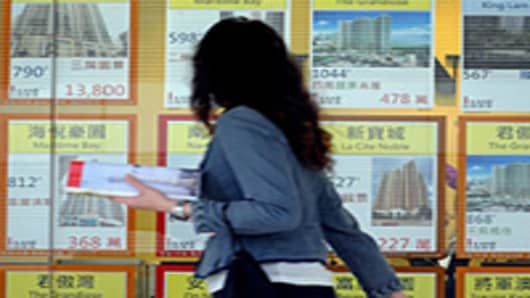Hong Kong’s notoriously volatile property market has emerged virtually unscathed by the credit crunch.
There was a short buying opportunity after the collapse of Lehman Brothersin September 2008, which caused prices to fall 17% in the last quarter of that year. But it closed almost as soon as it opened.
Hong Kong’s property prices shot up 31.4% last year, according to the University of Hong Kong Real Estate Index Series, and put on another 6.1% in gains for the first three months of this year. Instead of fretting about underwater mortgages and defaults, the Hong Kong government is attempting to cool the market.
The government, which controls the supply of new sites, has pledged to maintain a steady stream of plots for development. It has already taken measures to raise the minimum downpayment on homes of more than HK$20 million (US$2.6 million) to 40%, from 30%, and to increase the stamp duty on such luxury homes.
Two new sites came up for auction in May, and met with lackluster interest from developers. One site sold well below expectations, leading to lowered forecasts for the second, which still came in at the low end of those.
Now many experts expect a small correction in property prices, perhaps of 5%. “It is all about sentiment,” Buggle Lau, the chief analyst at the brokerage Midland Realty said. “During the first quarter, it was very strong, and people were panic buying.”
Even developers say it’s a positive sign that the market has taken a breather. David Tse, the managing director of L.T. Properties, a small developer that builds luxury homes in the New Territories, feels the response from the auctions was “reasonable,” and expects prospective buyers to wait and see.
“The price was jumping up like crazy,” Tse said. “Such a big increase in such a short period is not good. Now I would say it’s more healthy.”
Instead of buying, Leung and his wife have just rented a 1,500 square foot apartment in The Broadville apartment complex for HK$46,000 (US$5,900) per month. Though it’s a high rent, Leung believes it is worth it. Yields on such higher-end apartments are very low, 3% or less of the purchase price.
“If I wait for three years, 9% of the purchase price is the amount I’ll spend in rent,” Leung said. “A price adjustment of 9% or more is very likely in this time span. So I’m betting against the market.”
It was clear the market was reaching eye-popping levels.
Last October, an apartment in Henderson Land’s 39 Conduit Road development set a world record, selling for HK$439 million (US$56 million), or HK$88,000 (US$11,200) per square foot on the net area. On that basis, it replaced One Hyde Park in London as the most expensive residential real estate in the world.
The sale was controversial because the developer listed the unit as being on the 68th floor, considered a lucky number in Cantonese, when there are only 46 floors in the whole development. The Hong Kong government has since proposed new rules on the sale of uncompleted flats.
Such details seem to have done little to put off buyers in Hong Kong. The city of 7 million has seen its property in increasing demand, particularly across the border in mainland China. Rules on buying are the same for residents and non-residents alike, and there’s no capital gains tax.
According to a study put out by the Hong Kong office of Nomura International, mainland Chinese buyers accounted for 20% of all individual buyers in Hong Kong at the end of 2009, or one in five, up from 15% in September last year.



